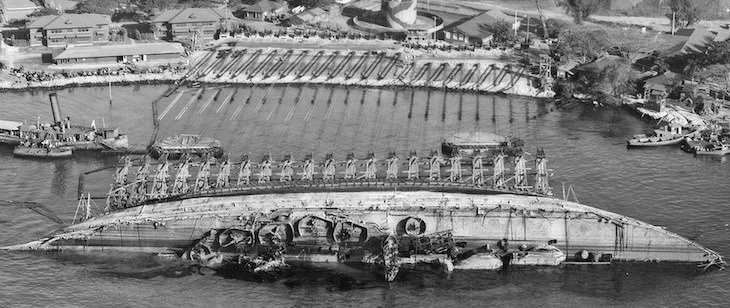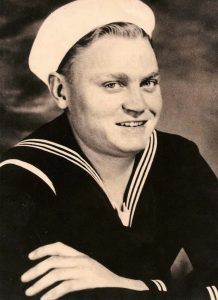DNA tests identify Pearl Harbor casualty from Lawrence County
by May 1, 2018 12:00 pm 4,084 views

Salvage operations on the battleship U.S.S. Oklahoma following the attack on Pearl Harbor.
The package in the mail was one William “Bill” Tipton hoped he would never receive. It was a shoe box containing seven coins, a belt buckle, a pair of glasses, three knives and other items. It reportedly contained the last personal effects of his son, Henry “Glenn” Tipton, a Seaman First Class that died in the U.S.S. Oklahoma during the Japanese attack at Pearl Harbor on Dec. 7, 1941.
There was only one problem. His son didn’t wear glasses.
The stuff in the box belonged to someone else. Bill Tipton died in 1985 and his son’s remains were never identified. It haunted him for his entire life, his son, Dr. Kenneth Tipton told Talk Business & Politics. What the father could never know is that his lost son will finally be buried in the family plot in Ravenden, Ark., on June 8.
The family learned earlier this month Glenn Tipton’s skull, two arm bones, a radius and other bone fragments were identified through DNA testing. A memorial service for the fallen seaman will be held at the Wings of Honor Museum in Walnut Ridge. Kenneth Tipton, 73, was born three years after his brother died, and never knew him, but he had an impact on his life, he said.
“I agonized a lot on behalf of my father,” he said. “It was an ordeal for him … it haunted him. He grieved his entire life about it.”
After the attack on the Oklahoma, the U.S. military recovered 429 bodies. The remains were jumbled, and it made it difficult to identify them, Kenneth Tipton said. Only 41 were identified and the rest were mixed together in about 80 coffins and buried, he said. Several years ago there was pressure to exhume the bodies and conduct DNA tests.

A sister, Willene McGuire, submitted her DNA in March of 2013 and so did Glen Titpton’s niece, Lynnette Cabrera. McGuire died a few months after her submission, her brother said. He submitted his DNA three years ago. The process took years, but they were able to find his brother, a man he’s learned a lot about through second stories from older cousins, newspaper clippings and other research.
TIPTON’S STORY
Glenn Tipton grew up in the Ozarks hills in western Lawrence County near Imboden. He knew tragedy early in his life. When he was 11, he and his two sisters were chasing rabbit with their pregnant mother. She slipped and fell on a tree stump, and died a short-time later. Her official cause of the death was listed as childbirth, but it was the fall that caused it, Kenneth Tipton said.
Bill Tipton worked as a school teacher and administrator. He worked at several rural schools in the region during the 1930s. It was the Great Depression and money was tight, Kenneth Tipton said. One night Bill told his kids they only had 50-cents. They could eat that night or go to movies. The children chose the movies, likely at the Hippodrome in Imboden, and went to bed that night hungry. They lived in various places during these years with little comforts, he said.
Glenn Tipton finished school in the eighth grade, and during that time there was no public high school to attend, Kenneth Tipton said. His brother was an average student and only tried hard enough to make passing grades, he said. Their father was his last teacher in school.
The young man grew to be six feet tall and weighed about 180 pounds. He was a good athlete and was the pitcher on the local baseball team. By 1937, Glenn had left home. According to family letters he made enough money to send a little back home to his sisters, and he even bought a car. In one letter he told them he made enough money to buy a suit to go to the fair. In 1939 he moved back in with his family and started working at a grocery store in Texarkana. Times were still tough, but one one letter Bill Tipton states he was “happier even if not earning much” in reference to his son’s return.
Bill Tipton re-married later that same year to a woman named Ollie Reed, of Mountain Home. On Feb. 5, 1940, Glenn Tipton enlisted in the Navy. He told his father he wanted to learn a trade. His last stint with his family occurred from mid-April through June 13, 1940. He contracted measles and was sent home to recover. The day he left he was assigned to the U.S.S. Oklahoma.
Kenneth Tipton isn’t sure what job his brother performed. The naval records he’s researched are largely silent on this point, but he did advance to Seaman First Class. His goals, according to the letters he sent home, were to stay in the Navy for 20 years, retire, and then build a house with a porch. He intended to spend long hours smoking a pipe on the porch.
CLINGING TO HOPE
His dreams were not meant to be. The historic attack ended his life, and his family received a notification he was missing in action. The family concocted many theories as to what could have happened, Kenneth Tipton said. The family clung to hope that maybe he jumped into the ocean and was captured by the Japanese. By February 1944 those hopes had faded. The family lived near Mountain Home at this time, and an newspaper clipping from the Baxter Bulletin stated he had posthumously received the Purple Heart.
There was another a painful reminder of his fate each month – an $18 life insurance check. His dad could have gotten a $1,000 lump sum payout, but that would have been a mistake, Kenneth Tipton said. The family needed the money, but it was a constant reminder of what they had lost.
Bill Tipton spend the rest of his life pondering how he could have changed his son’s life to keep him off the battleship that day. He often blamed himself for not stopping his son from joining the Navy, he said. Bill Tipton and the two sisters Glenn grew up with all died before his remains were identified.
It’s been 76 years and the family is thankful he can be brought back to the Ozark hills he shared with his family during his youth.
“This will bring closure to our family,” he said.
